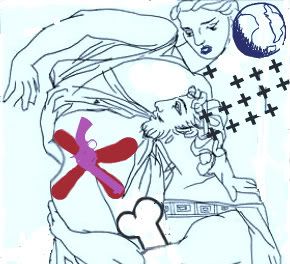Loosely translated, Lysistrata means "she who disbands armies."
Lysistrata was written in the final decade of the Peloponnesian War in which Athens and its allies fought against Sparta and the Peloponnesia League.
The title character engages the support of women from Sparta, Boeotia, and Corinththe to barricade the public funds building and withhold sex from their husbands in order to end the war. The other women are first against Lysistrata's suggestion to withhold sex, but finally agree and swear an oath of allegiance by drinking wine from a phallic shaped flask.
This action is ironic, because Greek men believed women had no self-restraint, a lack displayed in their alleged fondness for wine as well as for sex.
The play was originally performed in 411 BC at either the Dionysia or the Lenaia festival.
A different comedy by Aristophanes, Women at the Thesmorphoria, was also produced that year, and it is not clear which play was produced at which festival.
Lysistrata is perhaps the first completely positive female leader portrayed in theatre (who was a mortal and not a goddess).
Professor Elizabeth Scharffenberger (Columbia Classics) points out Lysistrata, "releaser of war," sounds remarkably similar to an important priestess in Athens at that time whose name, Lysimache, meant "releaser of the battle." The connection would have encouraged the association of Lysistrata with the goddess Athena.
The dialogue for the female characters is too compelling not be recognized as a belonging to a pro-female work. A central metaphor of the play is weaving. The idea that woman are better at going hither and thither and pulling together the strands of society positions women as essential to "weaving the fabric of a nation." The idea of a domestic skill being core to uniting a war-torn nation may seem unconvincing, but weaving was at the center of Athenian life.
Lysistrata touches upon the poignancy of young women left with no eligible young men to marry because of deaths in the wars: "Nay, but it isn't the same with a man/Grey though he be when he comes from the battlefield/still if he wishes to marry he can/Brief is the spring and the flower of our womanhood/once let slip, and it comes not again/Sit as we may with our spells and our auguries/never a husband shall marry us then."
As with all Greek comedies, the actors portraying male characters wore phalluses, but since audiences of the day were accustomed to this convention, there would be little shock-humor in seeing a comic phallus. Aristophanes' innovation seems to be in making the usually floppy huge comic phalluses stiff and erect.
The Lysistrata Project was a reaction to the Iraq disarmament crisis. On March 3, 2003 readings of the play were held on world-wide.
A present-day Lysistrata played out in the town of Pereira, Columbia in September 2006 when a group of gangsters' wives and girlfriends declared sex strike to force their partners to participate in a disarmament program.
In 2007, the play was staged for PBS and directed by James Thomas as part of a series on "Female Power & Democracy" that explored how female participation in civic life is moving from comedy to reality.







